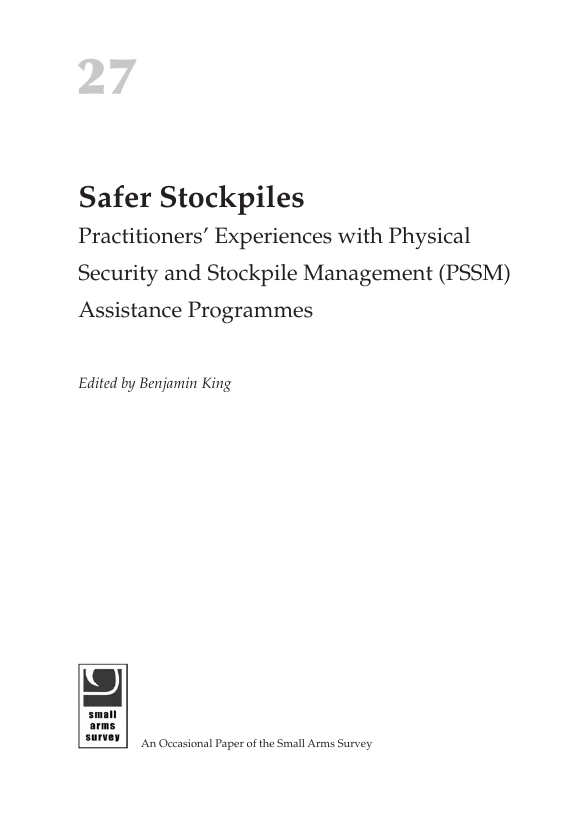
Safer Stockpiles: Practitioners’ Experiences with Physical Security and Stockpile Management (PSSM) Assistance Programmes (Occasional Paper 27)
Maintaining defence and security sector weapons and munitions safely and securely is vital, not only for a country’s readiness to defend itself, but also for its internal safety and stability. Mismanaged or unstable stockpiles can potentially have serious consequences: weapons and ammunition stolen from storage depots have fuelled crime, rebellions, and wars; and old or unstable munitions have spontaneously combusted, destroying entire stockpiles while inflicting casualties, and damaging buildings and infrastructure. While all state stockpiles are subject to these risks; they can be significantly reduced or mitigated when stockpiles are maintained effectively.
Physical security and stockpile management (PSSM) assistance programmes are donor-sponsored efforts to develop the capacity of a host nation to effectively protect and manage its arsenals throughout their life cycle. Activities range from training security forces in accounting and munitions handling practices to enhancing theft prevention and deterrence measures and refurbishing or building new storage depots.
Safer Stockpiles: Practitioners’ Experiences with Physical Security and Stockpile Management (PSSM) Assistance Programmes is an Occasional Paper from the Small Arms Survey which examines the challenges that commonly confront PSSM practitioners. The standards developed by modern militaries are not always easily applicable to countries using cold war or colonial-era infrastructure, or to those recently emerging from conflict. The practical knowledge gained from PSSM practitioners—technical experts involved in on-the-ground stockpile management— will be of great benefit to future programmes.
Edited by Small Arms Survey consultant Benjamin King, Safer Stockpiles includes contributions from Dave Diaz within the Office of Weapons Removal and Abatement at the US Department of State, from Steve Priestley from the Mine Action Group, and from the German Federal Ministry of Defence’s Bundeswehr Verification Centre.
The book discusses the process of planning a programme, with a focus on ways to avoid common challenges; it explores the implementation of PSSM programmes in least-developed nations, with limited resources; and provides a detailed case study of Germany’s efforts to assist Cambodia with stockpile management.
Safer Stockpiles was released ahead of the Open-ended Meeting of Governmental Experts on the Implementation of the Programme of Action at the UN in New York from 9–13 May 2011. This meeting will address the implementation challenges and opportunities in the specific area of marking, record-keeping and tracing, and related issues of national and regional frameworks and international assistance.
Have your say about Small Arms Survey publications and products: take 5 minutes to fill out our questionnaire.